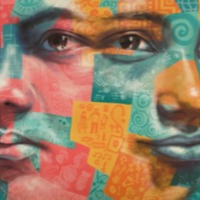
When he came back, I felt vindicated. My parents put up a fight and reported him to the police but I wasn’t listening. I went with him and we were easily allowed out of the country. Abroad, we stayed with some of his relatives. He told me it was temporary, until we could get our own place. He was seldom around, and I started catching glimpses of things that unsettled me.
When our baby was born, we went to the hospital and I signed where I was told to sign. I didn’t understand the language and I couldn’t read anything, so I had no idea what I was doing—except I still completely trusted him and what he was telling me. When we left the hospital without the baby, he said that they were just keeping it for observation and we could pick it up soon. I never saw my baby again, and that’s when the nightmare began.
We were kept in an apartment in a nondescript building. I was with other women who were just like me: young, uneducated, abandoned by their families and lured abroad by someone they loved—two other girls by the same guy that took me. We were drugged and raped several times a day. We were sometimes beaten. We didn’t have access to doctors or to the outside world. We didn’t have money or possessions. We were not allowed outside without supervision. I didn’t speak the language so I couldn’t call for help.
Several months into it, I got really sick. One of the older women there who helped the traffickers manage us—she “checked” me and told them I was finished, literally “she’s not good for anything.” I didn’t realize it then, but she probably saved my life.”
[…]
They blindfolded me and drove me around for a couple of hours. I thought they were going to kill me, take my organs, and throw me in a trashcan. I was terrified. But I was pushed out of the car and I heard them drive off. Because of what the lady had said, they probably thought my organs would be contaminated—that’s what I think now, but there’s no way to confirm. I was later picked up by the cops. It was days before they found someone who could communicate with me. I was kept in a jail cell and I started to withdraw from the drugs. When the translator finally came, he told me that they would start to process my deportation. I was not treated for my illness or for my withdrawals.
When I got back home, I found out that my family and small community had disowned me. I was considered a dirty person, a street person. I had nowhere to turn. I walked to the nearest city and started begging for money on the street. While I was homeless, someone approached me. I told her what had happened to me and she told me it was her job to help people like me. She took me to a clinic where I got treatment. I met other women who had gone through the same exact thing as I had—almost to the letter. Most of them had escaped; a few others, like me, had been abandoned. There are so many of us and probably so many more who don’t make it out alive.
Narrative source Youth Underground, a non-profit organization dedicated to preventing human trafficking through youth education, awareness-raising and advocacy.
The original narrative can be found here
Part 1 does not appear on the webpage
Part 2: https://www.facebook.com/YouthUnderground.CH/posts/1881459918556141
Part 3: https://www.facebook.com/YouthUnderground.CH/posts/1889184601117006









